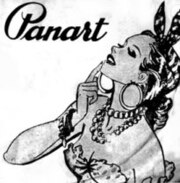Panart
| Panart | |
|---|---|

Artwork from a Panart LP sleeve.
|
|
| Founded | 1944 |
| Founder | Ramón Sabat |
| Defunct | May 29, 1961 |
| Genre | Cuban music |
| Country of origin | Cuba |
| Location | Calle San Miguel No. 410, Centro Habana, Havana |
Panart was the first and most successful independent record label in Cuba, founded in 1944 by engineer Ramón Sabat. In 1961, its studios were seized by Fidel Castro's communist regime and the label was nationalized, becoming "Panart Nacionalizada", which shortly after was absorbed by EGREM.
Together with RCA Victor's, Panart studios were the main recording studios in Cuba during the 1950s. Since the 1960s, they are known as the Areito studios, owned by EGREM. In addition, Panart acted as a distributor for Odeon, Musart, Sonora and Capitol Records.
After studying music, joining the army and obtaining a degree in engineering, Ramón Sabat began working in several music labels in New York City. In 1943, the label he was working in, Musicraft, folded, and he decided to bring the necessary assets to Cuba to fulfill his desire of establishing his own Cuban-based record company. Thus in 1944 Sabat became the founder and president of the Cuban Plastics & Record Corporation. According to Irais Huerta Rubio, the majority stockholder of the company was a Cuban electric company controlled by an American holding company. In 1945, the company sold the whole of its shares to Sabat, becoming the sole owner of the company and launching it under the name Panart (sometimes stylized Pan-Art, short for Panamerican Art). His wife, Julia Sabat, became the vice-president, and millionaire Enrique Gorrín became its treasurer. The company's headquarters and recording studios were at San Miguel 410, between Campanario and Lealtad, in Havana, while the pressing plant was located outside of the city. The first record released by Panart (cat. no. 1010) was a 10" single by Orquesta Hermanos Castro with the songs "Cucha el eco del tambó" and "Toda una vida".
In 1952, Panart obtained exclusive rights for the pressing of music licensed by Decca. A few years later this contract was broken as Decca reached an agreement with EMI/Capitol. The expansion of the record label was nonetheless unprecedented for a Caribbean label. After establishing a subsidiary (Panart Recording Corporation) in New York in 1952, the same year it pressed its first LPs, Panart was pressing half a million records a year, 20% of which was exported outside of Cuba (over 50% by 1959). Its dominance over the jukebox business in Cuba and the strategic (geographical) advantage over its main competitor, RCA Victor, explain part of Panart's success. Moreover, Panart was able to secure contracts with some of the most popular and innovative musicians and groups in the country, from Conjunto Casino to Julio Gutiérrez and Cachao.
...
Wikipedia
